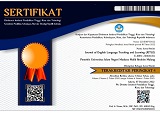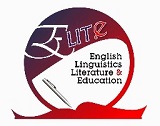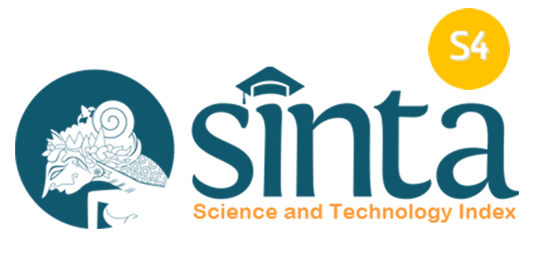Utilizing collaborative works: an attempt to enhance learners’ participation in English class
Abstract
This action research project aimed to improve the participation of learners in the class of General English. Collaborative activities were designed by grouping learners to work with the assigned tasks. The data were collected through observation. The findings showed that the participation of learners increased greatly characterized by the involvement of all learners in more active participation through group discussions and presentations of their works. Furthermore, the findings revealed that the learners look more confident to speak, more motivated to complete the assigned tasks, more enjoyable in learning, more focused on the lesson, and more engaged to think critically and creatively. In the attempt to disseminate our teaching experience, this article mainly focuses on the practical implementation of our collaborative action that is aimed to encourage other teachers and practitioners to implement the same research to improve their practices.
Full Text:
PDFReferences
Abdullah, M.Y., Abu Bakar, N. R., and Mabob, M. H. (2012). Student’s participation in classroom: what motivates them to speak up? Procedia – Social and Behavioral Sciences 51 (202) 516 – 522
Adams, A., R. (2013). Cooperative learning effects on the classroom. Unpublished thesis: Northern Michigan University.
Baines E., Blatchford, P., and Kutnik, P. (2008). The teacher’s role in implementing cooperative learning in the classroom. In R. M. Gillies, A. Ashman, & J. Terwel (Eds.), Pupil grouping for learning: Developing a social pedagogy of the classroom (pp. 56-72). New York: Springer.
Burns, A. (1999). Collaborative action research for English language teachers. Cambridge: Cambridge University Press.
Burns, A. (2010). Doing action research in English language teaching. New York: Routledge.
Castle Jr. T.D. (2014). The impact of cooperative learning on the development of need for cognition among first-year college students. Unpublished thesis: The University of Iowa.
Crawford, A., Saul, E. W., Mathews, S., and Makinster, J. (2005). Teaching and learning strategies for the thinking classroom. New York: The International Debate Education Association.
Debele, E. T., and Kelbisa, E. M. (2017). The role of active learning methods for classroom participation: the case of first-year students of sociology in Samara University. IOSR Journal of Humanities and Social Science, Vol. 22, Issue 7, 2017.
Gillies, R. M. (2008). The teacher’s role in implementing cooperative learning in the classroom. In R. M. Gillies, A. Ashman, & J. Terwel (Eds.), Teachers’ and students’ verbal behaviours during cooperative learning (pp. 238-257). New York: Springer Science+Business Media, LLC.
Gillies, R. M. (2016). Cooperative learning: Review of research and practice. Australian Journal of Teacher Education, 41 (3), 39-54.
Gokhale, A. A. (1995). Collaborative learning enhances critical thinking. Journal of Technology Education, 7 (1), 22-30.
Gonzalez-Cuevas, G., Rubio, M., Hernando, A., Alvarez, M. J., and Tavera, M. V. (2017). Action research plan to boost participation in college students. 3rd International Conference on Higher Education Advances.
Gull, F., and Shehzad, S. (2015). Effects of cooperative learning on students’ academic achievement. Journal of Education and Learning, 9 (3), 246-255.
Herrmann, K. J. (2013). The impact of cooperative learning on student engagement: Result from an intervention. Active Learning in Higher Education, 14 (3), 175-187.
Johnson, E.B. (2002). Contextual teaching and learning: What it is and why it’s here to stay. Thousand Oak, CA: Corwin Press.
Kemmis, S., McTaggart, R, and Nixon, R. (2014). The action research planner: Doing critical participatory action research. Singapore: Springer.
King, A. (2008). The teacher’s role in implementing cooperative learning in the classroom. In R. M. Gillies, A. Ashman, & J. Terwel (Eds.), Structuring peer interaction to promote higher-order thinking and complex learning in cooperating groups (pp. 73-91). New York: Springer.
Larsen-Freeman, D., and Anderson, M. (2011). Techniques and principles in language teaching; third edition. Oxford: Oxford University Press.
Lotan, R. A. (2008). The teacher’s role in implementing cooperative learning in the classroom. In R. M. Gillies, A. Ashman, & J. Terwel (Eds.), Developing language and mastering content in heterogenous classrooms (pp. 184-200). New York: Springer.
Miller, S. (2017). Group encouragement: Action research on cooperative learning. Retrieved from https://scholarworks.bgsu.edu/honorsprojects/256
Oliveira, L. C. (2015). A language-based approach to content instruction (LACI) for English language learners. Journal of Language and Literacy Education. Retrieved from https://www.google.com/url?sa=t&source=web&rct=j&url=http://jolle.coe.uga.edu/wp-content/uploads/
Scrivener, J. (2011). Learning teaching, the essential guide to English language teaching; 3rd edition. London: Macmillan education.
Slavin, R. E. (1982). Cooperative learning. USA: National Education Association of the United States.
Stevens, R. J. (2008). The teacher’s role in implementing cooperative learning in the classroom. In R. M. Gillies, A. Ashman, & J. Terwel (Eds.), Cooperative learning and literacy instruction in middle-level education (pp. 92-109). New York: Springer.
Tomal, D.R. (2010). Action research for educators, 2nd edition. Maryland: Rowman &Littlefield Education.
Tran, V. D. (2014). The effects of cooperative learning on academic achievement and knowledge retention. International Journal of Higher Education, 3 (2), 131-140.
Ur, P. (1991). A course in language teaching; Practice and theory. Cambridge: Cambridge University Press.
DOI: https://doi.org/10.18860/jetle.v1i2.8897
Refbacks
- There are currently no refbacks.
Jalan Gajayana 50 Malang 65144, Jawa Timur, Indonesia

This work is licensed under a Creative Commons Attribution-ShareAlike 4.0 International License.
Indexed by





